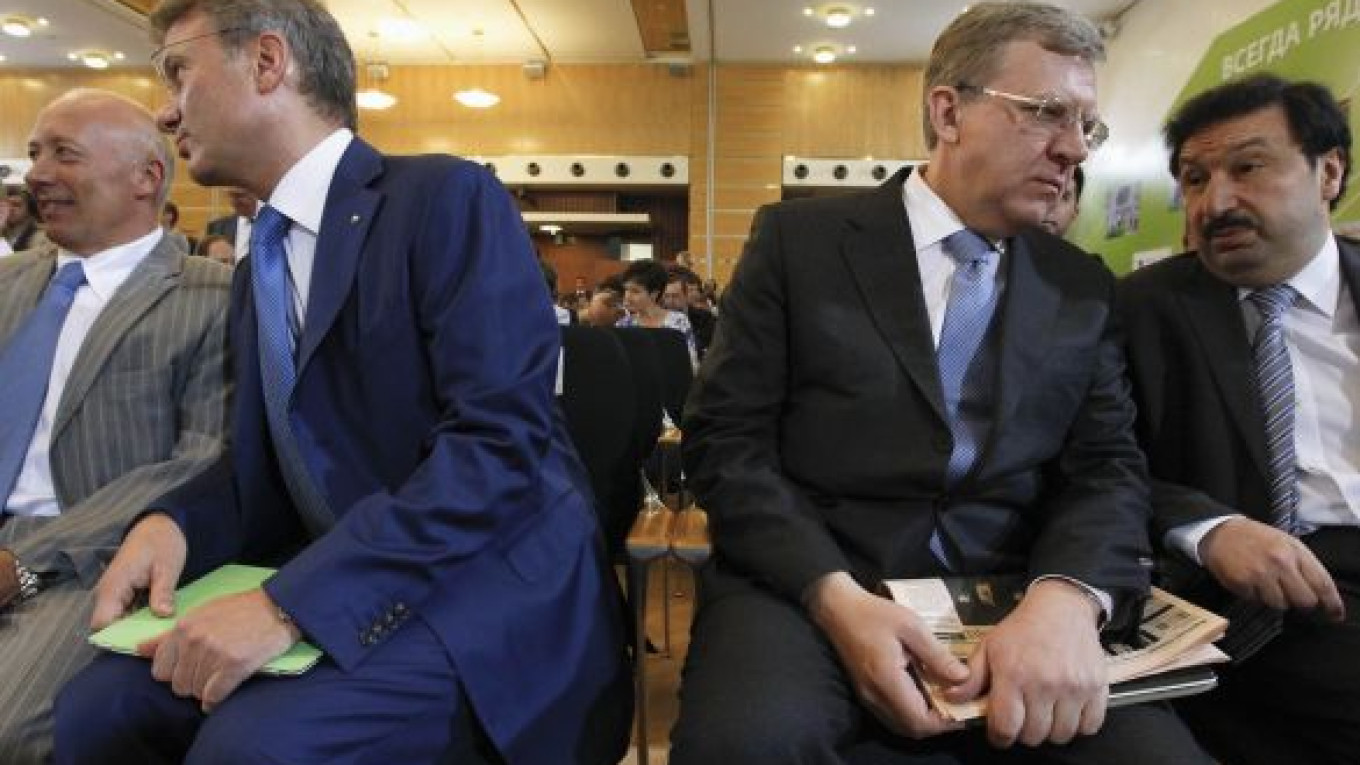Despite being in self imposed exile, liberal economist Sergei Guriev won a seat on the board of state-run banking giant Sberbank during its annual general shareholder meeting (AGM) on Friday, even though he had attempted to withdraw his candidacy after he fled the country.
Sberbank chairman German Gref, who was re-elected to the board though he received fewer votes than Guriev, said Guriev withdrew his nomination after 6 percent of shareholders already voted for him. After consulting with its lawyers, Sberbank decided to keep Guriev on the ballot and the former head of the New Economic School agreed.
On Thursday, the New Economic School’s board of directors accepted Guriev’s resignation from the post of rector, RIA Novosti reported.
Guriev said in an telephone interview from Paris on Friday that he wanted to escape pressure from a new criminal investigation around jailed tycoon Mikhail Khodorkovsky, once the country’s richest man. Guriev said he feared he could share the fate of witnesses in two previous investigations into Khodorkovsky who were later charged and died in prison.
“I don’t see under what circumstances I can return,” he said.
Investigators began proceedings early this year against the authors of an expert report commissioned by then-president Dmitry Medvedev in 2011, to which Guriev contributed, that criticized Khodorkovsky’s conviction in late 2010 for embezzling oil. He had been imprisoned since 2003 on charges of avoiding taxes on the same oil. His supporters fear that investigators are preparing a third set of charges to ensure he remains in jail.
According to investigators, the authors of the report had a conflict of interest because they had previously received money from Khodorkovsky.
Guriev denied receiving money from Khodorkovsky’s oil company, Yukos, once Russia’s largest, or bank, Menatep. However, Guriev said he did not consider that it would have been illegal to do so.
Two of the other five experts have been questioned by investigators but have not been charged.
Guriev began to worry when investigators interrogated him three times and searched his office, seizing hundreds of pages of documents and 45 gigabytes of e-mails dating back five years, on grounds he described as “extremely absurd.”
Though Guriev is only a witness in the case, he said his shock at investigators’ “lack of respect for the letter and spirit of the law” made him worry that they could name him as a suspect and take his passport away.
Guriev said he could not discuss the interrogations because he had signed a non-disclosure agreement. However, he said investigators informally told him that he was fair game for legal pressure because he had “started his political activity” in 2008, when he began advising Medvedev.
Guriev’s family moved to Paris without him 3 1/2 years earlier. “If it were part of a bigger plan, I would have of course moved before,” he said.
Guriev, who ran Moscow’s respected New Economic School from 2005 until his departure, has long enjoyed the reputation as one of Russia’s top economists and something of a maverick. When Medvedev was president from 2008 to 2012, Guriev was an informal government adviser and was seen as a key figure encouraging Westerners to invest in Russia. U.S. President Barack Obama spoke at the school while on a state visit in 2009 that both sides used as a springboard for improving relations.
Guriev’s sudden departure has made him a poster boy for the uncertainty and fear gripping liberal members of the Russian elite.
According to Sberbank rules, he can attend meetings in person or remotely. If Guriev misses 10 percent of board meetings, he won’t receive compensation. It was earlier reported that the Central Bank casts its votes in favor of Guriev, but outgoing head of the financial regulator Sergei Ignatyev said the Central Bank did not vote for Guriev.
Liberal figures who flourished under Medvedev, who is now prime minister and widely derided as weak, have come under heavy fire since Putin returned to the presidency last year.
“In the last year, we’ve seen a lot of things which we thought are impossible,” Guriev said. “Some people who were high profile are now no longer there.”
Material from The Moscow Times was used in writing this report.
Related articles:
A Message from The Moscow Times:
Dear readers,
We are facing unprecedented challenges. Russia's Prosecutor General's Office has designated The Moscow Times as an "undesirable" organization, criminalizing our work and putting our staff at risk of prosecution. This follows our earlier unjust labeling as a "foreign agent."
These actions are direct attempts to silence independent journalism in Russia. The authorities claim our work "discredits the decisions of the Russian leadership." We see things differently: we strive to provide accurate, unbiased reporting on Russia.
We, the journalists of The Moscow Times, refuse to be silenced. But to continue our work, we need your help.
Your support, no matter how small, makes a world of difference. If you can, please support us monthly starting from just $2. It's quick to set up, and every contribution makes a significant impact.
By supporting The Moscow Times, you're defending open, independent journalism in the face of repression. Thank you for standing with us.
Remind me later.


